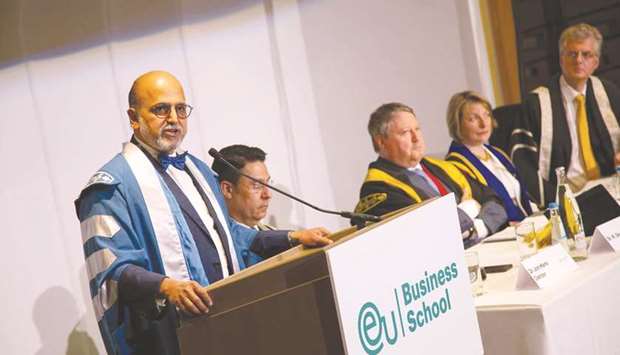Institutions should explore the concept of sustainable finance to other sustainable development goals based on their willingness and risk appetite to participate in financing such areas, according to Doha Bank CEO Dr R Seetharaman.
Seetharaman, who gave a keynote address on ‘Global Disruptions and Opportunities’ at the 2018 commencement ceremonies of the EU Business School in Germany, noted that central banks have a key role to play in enabling green financial instruments.
“This could be done through establishing green finance guidelines and frameworks to integrate environmental and social considerations into bank lending decisions. The disruptions such as technology and trade should be an enabler for sustainable global growth,” he said.
Highlighting on sustainable development issues, Seetharaman said China emerged as the biggest emitter of carbon emissions, followed by the US, the EU, and India. He said global carbon dioxide emissions surged to record levels in 2017 after the landmark 2016 Paris climate agreement was signed.
“Sustainable finance refers to any form of financial service integrating environmental and social factors into the business or investment decisions for the lasting benefit of both clients and society at large and contribute to green economies. The 17 Sustainable Development Goals not just cover climate change but extends to areas such as health, education, and infrastructure, among other,” Seetharaman said.
On developments in technology, Seetharaman said the Fourth Industrial Revolution combines advanced technologies in innovative ways, dramatically reshaping the way people live, work, and relate to one another.
“Various industries are getting redefined, the health sector can be reimagined, the work space is undergoing changes, robotics and artificial intelligence are going to play important roles, and the customer will be more empowered in the digital environment. We are witnessing smart cities development across the globe. Investment in such cities looks at characteristics of cities, capital requirements for various initiatives, and the decision-making process.
“The structure of the payments and retail banking market is breaking up. An open banking model is emerging up. Open banking enables third parties to develop new products and services through use of APIs (application programming interface). Accelerating digital ecosystem development could lead to cashless economies. Block chain technologies are used in remittances, clearance and settlement systems, and trade finance,” he said.
On global economies, Seetharaman said global growth is expected to be at 3.9% in 2018, while advanced economies are projected to grow at 2.5% this year, and growth in emerging markets and developing economies is expected to increase to 4.9% in the same period.
“Global flows of foreign direct investment fell by 16% in 2017 to an estimated $1.52tn. The FDI in sectors that can contribute to the Sustainable Development Goals is still badly needed. Promoting FDI for sustainable development remains a challenge. Global levels of corporate and sovereign debt represented a risk,” said Seetharaman, who also participated in the EU Business School’s commencement ceremonies in Switzerland.

Dr R Seetharaman delivering the keynote address.
